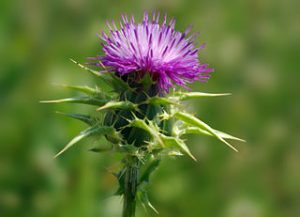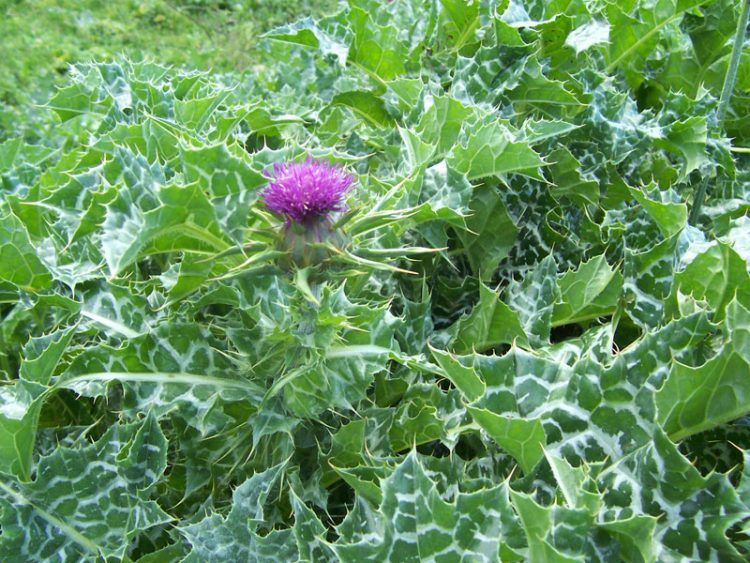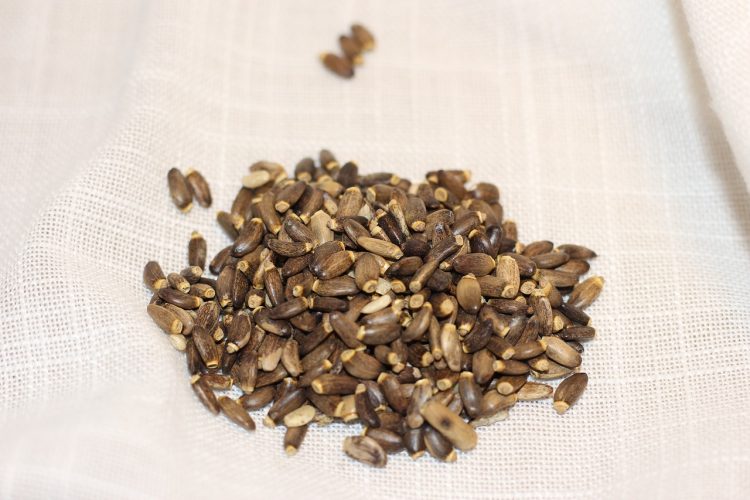Despite its immense popularity, clinical research on milk thistle’s liver benefits remains inconclusive.

- Liver regeneration. Silymarin appears to promote liver tissue regeneration.
- Stabilizing cell membranes. Silymarin can protect liver cells against toxins by altering and stabilizng their membranes.
- Antioxidant activity. Silymarin protects the liver from oxidative stress by neutralizing free radicals and increasing the body’s own antioxidants.
- Protecting against fibrosis. Silymarin prevents specialized cells from depositing fibers that lead to fibrosis and cirrhosis.
- Reducing inflammation. Silymarin has anti-inflammatory effects that protect the liver from damage.
Overview
Milk thistle (Silybum marianum) is a flowering plant native to the Mediterranean. It has been used for over 2,000 years for a variety of conditions, but is best known for its liver-protective effects. The main active ingredient responsible for milk thistle’s benefits is called silymarin.
Today, milk thistle products are used to lower blood cholesterol, help with diabetes, allergies, heartburn, and acne, and support liver and gallbladder health. Common liver conditions people take milk thistle for include cirrhosis, hepatitis, and non alcoholic fatty liver disease (NAFLD).
Despite its reputation as the number one herbal remedy for liver health, four decades of clinical research on milk thistle have reported mixed results, with some positive findings, and some studies showing no beneficial effects.

How Milk Thistle Might Help With Liver Health
Milk thistle contains multiple flavonoid and polyphenol compounds – including silybin, silydianin, and andsilychrstine – collectively known as silymarin. Silymarin has been suggested to protect and support liver health through five major properties: 1
Promoting liver regeneration
Because silymarin has a similar structure to steroid hormones, it appears to be able to promote the production of DNA and RNA. In turn, this effect stimulates liver tissue regeneration. 2
Supporting liver cell membranes
Silymarin can prevent toxins from entering liver cells by stabilizing the structure of their external membrane and altering its permeability. 3
Antioxidant activity
Oxidative stress caused by free radicals is known to play a critical role in many serious health disorders, including liver conditions.4 Silymarin helps neutralize free radicals, and also increases the levels of glutathione, one of the body’s main antioxidants.
Protecting against liver fibrosis
When hepatic stellate cells transform into activated myofibroblasts they deposit collagen fibres in the liver, leading to fibrosis and eventually cirrhosis. Silymarin has been demonstrated to suppress this transformation. 5
Reducing liver inflammation
Hepatic (liver) inflammation plays a central role in hepatitis and other liver disorders. Silymarin has anti-inflammatory properties that decrease inflammation and inflammatory cytokines. 6
Milk Thistle Uses & Benefits for Liver Health
Milk thistle is the most popular herbal supplement for supporting liver health and protecting against hepatitis, cirrhosis, and fatty liver disease – the most common liver disorders.
Despite its popularity, decades of clinical research on milk thistle’s liver-protective effects have produced inconclusive, mixed results, with some positive and some negative findings.
Systematic reviews of this available research – which includes dozens of studies – have come to similarly contradictory conclusions. Whereas one recent review concluded that, “Our results question the beneficial effects of milk thistle for patients with alcoholic and/or hepatitis B or C virus liver diseases and highlight the lack of high-quality evidence,” 7 another review stated that, “…it is reasonable to employ silymarin as a supportive element in the therapy of Amanita phalloides poisoning but also (alcoholic and grade Child ‘A’) liver cirrhosis.” 8
As such, it seems that milk thistle and silymarin are worth a try for people suffering from liver health problems, but efficacy is not guaranteed.
In addition, many milk thistle supplements are advertised as a way to “cleanse” or “detoxify” the liver, but these terms are simply marketing buzzwords without any medical backing. The only appropriate medical usage of the term “detox” refers to the treatment of people with drug addiction.

Research
Human Research
Human studies of silymarin report conflicting results, with some studies reporting positive findings in people with hepatitis C, NAFLD, cirrhosis, and alcoholic liver disease, and other studies showing no beneficial effects.
Silymarin (420-700 mg) does not appear to alleviate hepatitis C in therapy-resistant individuals
This randomized, double-blind, placebo-controlled study looked at the effects of silymarin on liver disease in people with chronic hepatitis C who did not respond to standard (interferon) therapy. A total of 154 people were given placebo, 420 mg, or 700 mg silymarin 3 times daily for 24 weeks. There was no significant difference in ALT levels – a measure of liver function – or other measures of liver health between the three groups.
- The researchers concluded that “Higher than customary doses of silymarin did not significantly reduce serum ALT levels more than placebo…” 9
Silymarin use may improve symptoms and quality of life in chronic hepatitis C patients
This National Institutes of Health-sponsored study explored the effects of silymarin on chronic hepatitis C patients who didn’t respond to antiviral therapy. A total of 1145 patients were questioned on their supplement use. Those who took silymarin were found to have fewer and milder symptoms of liver disease and better quality of life, although these improvements were not associated with a change in viral activity or inflammation.
- The researchers concluded that “Silymarin use among patients with advanced hepatitis C-related liver disease is associated with reduced progression from fibrosis to cirrhosis, but has no impact on clinical outcomes.” 10
Silymarin (420 mg) appears to protect the liver from alcohol cirrhosis
This widely-cited randomized, double-blind, placebo-controlled study tested the effects of silymarin on liver cirrhosis. A total of 170 patients were given placebo or 420 mg silymarin daily for 2 years. The silymarin group had a higher 4-year survival rate (58% vs 39% for placebo), and further analysis revealed that the treatment was effective for patients with either alcoholic or Child A-type cirrhosis.
- The researchers concluded that “The effects of silymarin appears to be in the prevention of some metabolic or toxic effects of alcohol on the liver.” 11
Silymarin (450 mg) does not appear to improve alcoholic liver cirrhosis
This randomized, double-blind, placebo-controlled study examined the effects of silymarin on liver cirrhosis. A total of 125 people with alcoholic liver cirrhosis were given placebo or 450 mg silymarin (in three doses) daily for 2 years. Silymarin did not show any significant effects on the progression of the condition.
- The researchers concluded that “The results of this study indicate that silymarin has no effect on survival and the clinical course in alcoholics with liver cirrhosis.” 12
Silymarin (210 mg) appears to improve liver function in NAFLD
This randomized, placebo-controlled study examined the effects of silymarin on non alcoholic fatty liver disease (NAFLD). A total of 64 patients were given placebo or silymarin (210 mg) daily for 8 weeks and advised to follow a diet and exercise regimen. Compared to placebo, the silymarin group experienced a significant reduction in ALT and AST enzyme levels – the leading markers of liver health.
- The researchers concluded that “silymarin is a useful herbal drug for the treatment of NASH.” 13
Silymarin (700 mg) may reduce liver fibrosis, but does not seem to significantly improve NAFLD
In this randomized, double-blind, placebo-controlled study, 99 non alcoholic fatty liver disease (NAFLD) patients were given placebo or silymarin (700 mg) in three daily doses for 48 weeks. Although the silymarin group experienced better improvements in some measures of liver health such as fibrosis, it did not have a significant effect on NAFLD activity score (NAS).
- The researchers concluded that “silymarin (700 mg, given 3 times daily for 48 weeks) did not reduce NAS scores by 30% or more in a significantly larger proportion of patients with NASH than placebo.” 14
Dosage for Liver Health
- There is too little research to suggest a research-backed dosage, although 210-420 mg silymarin has been successfully used
- Standalone and multi-ingredient milk thistle supplements typically provide 250-300 mg dosages of seed extract standardized to 80% silymarin
Available Forms
- Milk thistle is typically sold in capsules or tablets.
- Milk thistle seed extract. Basic milk thistle extract that is typically equivalent to 1000 mg of whole herb.
- Standardized extract. Unlike basic seed extracts, standardized ones are guaranteed to contain at least 80% silymarin.
- Milk thistle seeds. Raw milk thistle seeds can be ground and used as a coffee substitute.
Supplements in Review Recommendation
- Milk thistle silymarin extract 250-500 mg for liver health.
Milk thistle silymarin is worth a try for liver issues. Despite its reputation as the go-to liver herb, extensive research on milk thistle has reported mixed results. As such, we can’t say for sure whether it will work for you, but it’s worth trying.
Successful studies tend to use doses containing 210-420 mg silymarin. Most milk thistle extracts come in 250 mg capsules containing 80% silymarin. As such, taking 1-2 capsules translates into dosages similar to the ones used in clinical research.
Leave a Reply